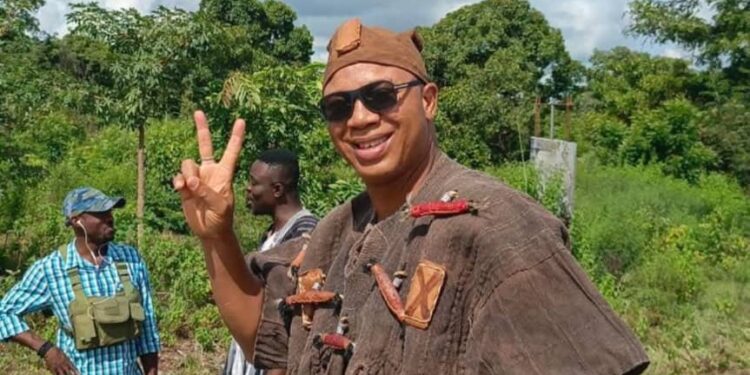By: Johannes Jafo Akunatu [0247019099; akjafo@gmail.com]
In our political landscape, which is full of noise, where the volume of words often hides the weight of outcomes, one individual has become a silent impact maestro. Hon. Adam Mutawakilu, popularly known as Hon. Galus, is not merely another name in the political history of Savannah Region and Ghana. He is a miracle of calm efficiency, quiet strength, and indomitable will. Just like the tiger that moves quietly through the forest, unnoticed but definitely there, Hon. Galus has established a legacy not of show but of substance.

His narrative is not only about the political turmoil but also about the transformation. The first position he held was that of the District Chief Executive for West Gonja; subsequently, he was elected twice as the Member of Parliament for the Damongo constituency, and now the Managing Director of Ghana Water Company Limited. Each phase of his life is marked by the same qualities such as discipline, empathy, and foresight. He has passed through the political jungle not making sounds and displaying power, but with the carefulness of a strategist — the tiger’s carefulness.
During his time as DCE, the residents of West Gonja encountered a novel type of leader, one who rather listened than talked, and one who preferred the building of institutions over the building of fanfare. His leadership was never for the eye. He was aware that development is not always loud; sometimes, it is a silent revolution that is happening and taking place below the surface. He got trust not through oratories but through changes that were even more visible and became part of people’s lives.
As a Member of Parliament, Hon. Galus shifted his attention to the empowerment issues. In a political environment that is usually characterized by handouts and non-fulfilling promises, he set a new standard for being generous. More than two hundred women’s groups in Damongo and the adjoining communities were provided with tools and support, and trained in Village Savings and Loans methodology. This was not a form of charity but rather a means of building up one’s capability. It was the type of initiative that continues to exist beyond political cycles because it converts dependence into self-sufficiency.
To sum it up, education was at the center of his leadership. The then MP started an award scheme for the best BECE candidates, which was a very strong sign that he was promoting education and giving back effort its right place. He pushed for getting scholarships for undergraduates and graduates students, thus closing the gap between dreaming big and getting the opportunity. Many of the beneficiaries today are doctors, nurses, engineers and other professionals – silent witnesses of his mission that by education one can easily get out of poverty.
He also left his mark on infrastructure. He was the one to connect the most distant villages to the national power grid and to build CHPS compounds with his Common Fund; Hon. Galus made it clear that development was not something abstract – it was light in a child’s classroom, health in a mother’s reach, and dignity in a community’s growth. And he managed all that without a ministerial title, showing that sometimes it is the little things that count and being in a position is not a factor in the practice of leadership.
However, in the unpredictable world of politics, principles were to some extent sacrificed. Before his second term in Parliament came to an end, some voters expressed their dissatisfaction, not because of his failures, but because of his refusal to adopt a political course different from that of others. In a time when politics is heavily influenced by money with lavish rallies and gifts to voters, his calm and values-led approach looked strange. He was not one to throw money around just to get people to follow him; he would rather get involved in the resolution their problems. He did not vie for the audience’s favor but rather for the preservation of his reputation.
To Hon. Galus, leadership is not defined by the number of envelopes one distributes but rather by the number of lives one empowers. He sees handouts as mere temporary solutions that last only till the end of day whereas empowerment as an everlasting process throughout generations. He chose the harder way—the way of systematic change, of educating the people to be self-sufficient rather than making them reliant.
The foundation of his philosophy is formed by empathy and belief. Galus is a leader who over the years not only sees election cycles but also sees human lives in their continuity. He, however, takes a long-term approach to everything, which is nothing but deliberate, gradual, and sharp. The tiger does not run after each and every commotion that happens in the jungle; it first surveys the surroundings, forms a plan, and then acts when the success is guaranteed.Thus, Hon. Galus leads.
His humility is probably his most misinterpreted quality. A different world can be seen through a political prism in which some politicians bask in constant media attention and visibility while he would still prefer to be heard through his acts. He does not trumpet his generous acts; instead, he practices them in silence, driven by faith and a powerful inner belief. His kindness is both scriptural and spiritual. In one of the Gospels, the Savior urges Christians to do their acts of kindness in secret, for “the Father who knows what is done in secret will reward you” (Matt. 6:3-4). The same principle is found in the Quran where it says, “If you hide your charity and give it to the poor, it will be better for you” (Qur’an 2:271).
Hon. Galus does not merely regard these verses as words of faith, but rather, he lives them as a blueprint for morality. He has been the source of job opportunities for innumerable people, especially for young graduates who might have otherwise been left floating with no support. Nevertheless, he is never after the glory. His satisfaction is in the result, not the recognition. Like a nocturnal tiger in the jungle, he moves invisible but with remarkable impact.
His effectiveness and silence have been remarkably recognized. Now, his leadership as the Managing Director of the Ghana Water Company Limited is still impacting the public sector in Ghana. Water, the most basic human need, has become the emblem of his mission — to make the indispensable available, to bring existence where it is most needed. The company has been energized, more efficient, and more professional in its dealings through his direction. He deals with administration with the same quiet precision as in his political career that was characterized by studying, understanding, and acting.
To understand Hon. Galus is to understand a philosophy of power without noise, achievement without arrogance, and service without publicity. His leadership goes against the usual political scenario. He doesn’t pursue publicity since he believes that the real light comes from within. He doesn’t shout to demand his audience; rather, his achievements have the power of being the truth.
The way he presents himself has its own kind of poetry — serenely yet dominantly, softly yet decisively. He is the embodiment of a different kind of leader: stable, reflective, and ethically strong. In the current situation when the political arguments are mostly full of wildness, he shows us that the silence, persistence, and dedication are the ones who win the fights.
Future generations will not associate the name of Adam Mutawakilu with noise or controversies when they get a chance to revisit the political history of the Savannah Region — but with endurance, moral integrity, and gentleness. His impact will not be measured by the frequency of his words, but by the depth of his service.
He is like a tiger who prefers to walk alone but solo not without a reason. His every move is intentional. His every decision is carefully weighed. His every action is significant. Ultimately, his narrative is a parable for leaders in Ghana—that greatness Is not necessarily noisy. Sometimes the silence is what decides the future.
Because, in the jungle of leadership, when the tiger is around, the forest does not tremble in terror—it gives tribute to the ruler.
















